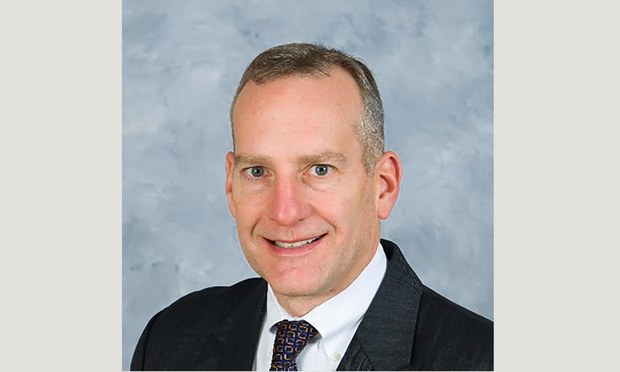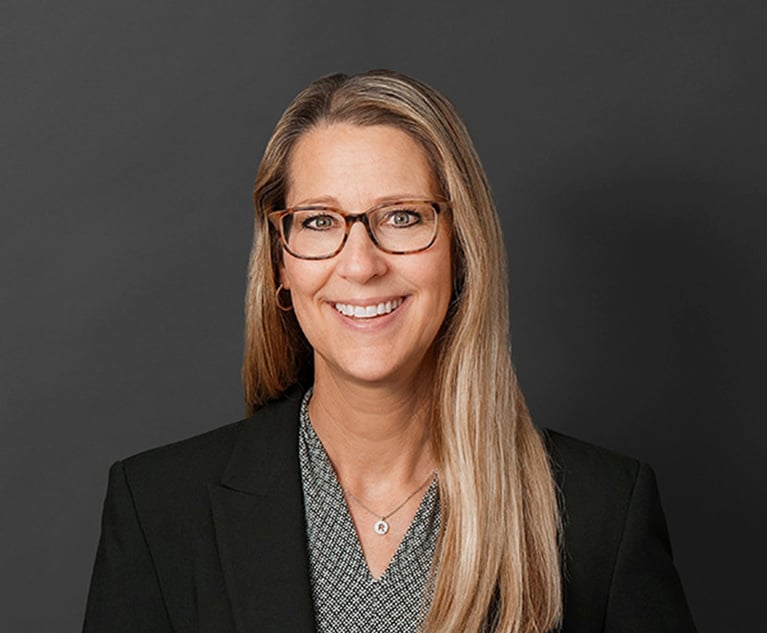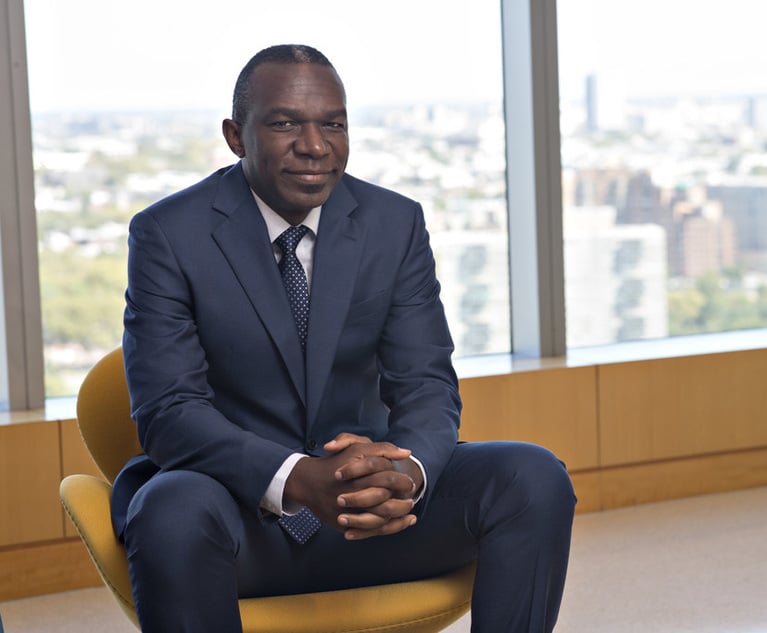New JCB Chief: No Shakeups on the Horizon
Pennsylvania Judicial Conduct Board Chief Counsel Richard Long said the board's goal is "to continue to have the courage to make the difficult choices to do the right things for the right reasons, whether it's making a finding where there's no misconduct—even if there's a perception in the media or in the public to the contrary."
February 26, 2019 at 02:20 PM
3 minute read
 Richard W. Long.
Richard W. Long.
Pennsylvania Judicial Conduct Board Chief Counsel Richard Long says he foresees no significant changes in the way the state's judicial watchdog operates under his leadership.
Long took over the post in late December when the board's previous chief counsel, Robert Graci, retired. Since then, Long said much of his time so far has been spent learning the ropes.
He likened this experience to his 2005 deployment to Iraq as an Army Reserve Judge Advocate General officer. There's little you can do to prepare, he said, adding, “You just have to wait 'til you get there.”
But Long said that, by now, he's used to on-the-job training. “I realized it would be a lot of learning on the fly.” He also noted that his transition was eased by guidance from Graci.
Long's last position was head of the Pennsylvania District Attorneys Association. Prior to that he worked for the Cleveland Browns NFL team and as a prosecutor in Dauphin County. Long was drawn to the chief counsel position because of its prosecutorial element, and because it gives him the chances to be directly involved in cases again.
“While I enjoyed my time at the DA's association, I was always one step removed. We did not have cases of our own,” he said. “I missed being more directly involved.”
The board is staffed by four investigators, six attorneys and four support personnel. Chief counsel before Long have often spoken of the scarcity of manpower and resources they have to police 67 counties' worth of judges. Long is no exception.
He maintains that resources are being used wisely, however. To make the most of what the board has, he said the priority is to identify which complaints are frivolous and which are legitimate as early as possible, something Long said his prosecutorial experience helps him do. He added that his staff does a good job of vetting potential cases.
In addition to slim resources, Long has to contend with Pennsylvania's—and notably, Philadelphia's—historic vulnerability to judicial misconduct.
While Long was wary of pointing fingers at any particular jurisdiction, the Harrisburg native did offer some analysis of the volume of complaints coming from Philadelphia.
“It's by far the largest county in the commonwealth; just by volume you're going to get a lot of activity in Philadelphia,” he said. “It's a big, brash city so you're going to have very strongly held opinions, whether you're a litigant or a judge.”
As far as institutional improvements are concerned, Long said he hasn't yet identified any areas in need of tweaking, though he is open to periodic re-examination.
“If things are working well, I'm not one to come in and say, 'We're going to do it this way because I say so,'” Long said.
All in all, Long said the board's mission is to keep on doing what it's been doing.
Mostly, “to continue to have the courage to make the difficult choices to do the right things for the right reasons, whether it's making a finding where there's no misconduct—even if there's a perception in the media or in the public to the contrary,” Long said. “And also to have the courage to say that when someone does something wrong, they need to be held accountable.”
This content has been archived. It is available through our partners, LexisNexis® and Bloomberg Law.
To view this content, please continue to their sites.
Not a Lexis Subscriber?
Subscribe Now
Not a Bloomberg Law Subscriber?
Subscribe Now
NOT FOR REPRINT
© 2025 ALM Global, LLC, All Rights Reserved. Request academic re-use from www.copyright.com. All other uses, submit a request to [email protected]. For more information visit Asset & Logo Licensing.
You Might Like
View All


Trending Stories
- 1Exploring the Opportunities and Risks for Generative AI and Corporate Databases: An Introduction
- 2Farella Elevates First Female Firmwide Managing Partners
- 3Family Court 2024 Roundup: Part I
- 4In-House Lawyers Are Focused on Employment and Cybersecurity Disputes, But Looking Out for Conflict Over AI
- 5A Simple 'Trial Lawyer' Goes to the Supreme Court
Who Got The Work
J. Brugh Lower of Gibbons has entered an appearance for industrial equipment supplier Devco Corporation in a pending trademark infringement lawsuit. The suit, accusing the defendant of selling knock-off Graco products, was filed Dec. 18 in New Jersey District Court by Rivkin Radler on behalf of Graco Inc. and Graco Minnesota. The case, assigned to U.S. District Judge Zahid N. Quraishi, is 3:24-cv-11294, Graco Inc. et al v. Devco Corporation.
Who Got The Work
Rebecca Maller-Stein and Kent A. Yalowitz of Arnold & Porter Kaye Scholer have entered their appearances for Hanaco Venture Capital and its executives, Lior Prosor and David Frankel, in a pending securities lawsuit. The action, filed on Dec. 24 in New York Southern District Court by Zell, Aron & Co. on behalf of Goldeneye Advisors, accuses the defendants of negligently and fraudulently managing the plaintiff's $1 million investment. The case, assigned to U.S. District Judge Vernon S. Broderick, is 1:24-cv-09918, Goldeneye Advisors, LLC v. Hanaco Venture Capital, Ltd. et al.
Who Got The Work
Attorneys from A&O Shearman has stepped in as defense counsel for Toronto-Dominion Bank and other defendants in a pending securities class action. The suit, filed Dec. 11 in New York Southern District Court by Bleichmar Fonti & Auld, accuses the defendants of concealing the bank's 'pervasive' deficiencies in regards to its compliance with the Bank Secrecy Act and the quality of its anti-money laundering controls. The case, assigned to U.S. District Judge Arun Subramanian, is 1:24-cv-09445, Gonzalez v. The Toronto-Dominion Bank et al.
Who Got The Work
Crown Castle International, a Pennsylvania company providing shared communications infrastructure, has turned to Luke D. Wolf of Gordon Rees Scully Mansukhani to fend off a pending breach-of-contract lawsuit. The court action, filed Nov. 25 in Michigan Eastern District Court by Hooper Hathaway PC on behalf of The Town Residences LLC, accuses Crown Castle of failing to transfer approximately $30,000 in utility payments from T-Mobile in breach of a roof-top lease and assignment agreement. The case, assigned to U.S. District Judge Susan K. Declercq, is 2:24-cv-13131, The Town Residences LLC v. T-Mobile US, Inc. et al.
Who Got The Work
Wilfred P. Coronato and Daniel M. Schwartz of McCarter & English have stepped in as defense counsel to Electrolux Home Products Inc. in a pending product liability lawsuit. The court action, filed Nov. 26 in New York Eastern District Court by Poulos Lopiccolo PC and Nagel Rice LLP on behalf of David Stern, alleges that the defendant's refrigerators’ drawers and shelving repeatedly break and fall apart within months after purchase. The case, assigned to U.S. District Judge Joan M. Azrack, is 2:24-cv-08204, Stern v. Electrolux Home Products, Inc.
Featured Firms
Law Offices of Gary Martin Hays & Associates, P.C.
(470) 294-1674
Law Offices of Mark E. Salomone
(857) 444-6468
Smith & Hassler
(713) 739-1250






